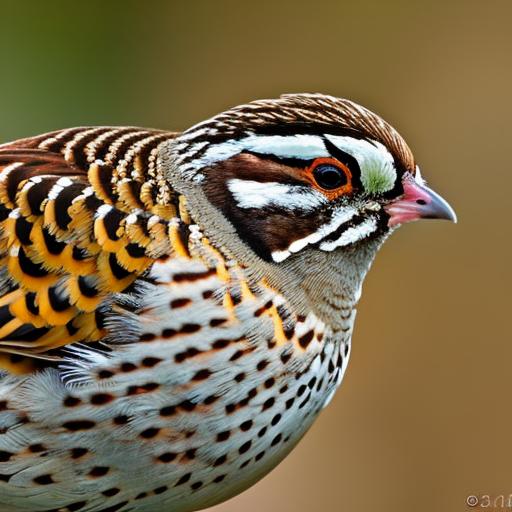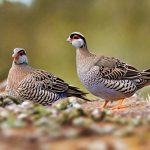Coturnix quail, also known as Japanese quail, are small birds that are native to East Asia. They are popular among poultry enthusiasts for their small size, fast growth, and high egg production. Coturnix quail are generally hardy birds, but they do have specific cold tolerance limits. Understanding their cold tolerance is crucial for keeping them healthy and comfortable in colder climates.
Coturnix quail are well adapted to cold temperatures, but they do have their limits. They can tolerate temperatures as low as 50 degrees Fahrenheit, but anything lower than that can be detrimental to their health. When exposed to temperatures below 50 degrees Fahrenheit, coturnix quail can experience stress, decreased egg production, and even death if not properly cared for. It’s important for quail owners to be aware of their birds’ cold tolerance and take the necessary steps to ensure their well-being during colder months.
Key Takeaways
- Coturnix quail can tolerate cold temperatures, but proper shelter and care are essential for their well-being.
- Factors such as age, health, and feather condition can affect a quail’s tolerance to cold weather.
- Providing proper shelter, such as insulated coops with dry bedding and draft protection, is crucial for keeping quail comfortable in cold weather.
- Feeding high-energy, high-protein diets and ensuring access to unfrozen water are important considerations for quail in cold temperatures.
- Monitoring for signs of illness, such as lethargy and decreased egg production, is crucial for maintaining the health and wellness of quail in cold climates.
Factors Affecting Cold Tolerance in Coturnix Quail
Several factors can affect the cold tolerance of coturnix quail. One of the most important factors is the age of the birds. Young quail are more susceptible to cold temperatures than adult birds. This is because young birds have less developed feathers and body fat, which are essential for insulation and warmth. Additionally, older birds have had more time to acclimate to colder temperatures, making them more resilient to cold weather.
Another factor that affects cold tolerance in coturnix quail is their overall health and condition. Birds that are in poor health or under stress are more vulnerable to the effects of cold weather. It’s important for quail owners to ensure that their birds are in good condition and free from any underlying health issues that could be exacerbated by cold temperatures.
The quality of the quail’s shelter also plays a significant role in their cold tolerance. A well-insulated and draft-free shelter can help protect the birds from the harsh effects of cold weather. Proper nutrition and access to clean water are also crucial for maintaining the birds’ overall health and resilience to cold temperatures.
Providing Proper Shelter for Coturnix Quail in Cold Weather
Providing proper shelter is essential for ensuring the well-being of coturnix quail in cold weather. A well-insulated coop or shelter is crucial for protecting the birds from the harsh effects of cold temperatures. The coop should be draft-free and provide adequate ventilation to prevent moisture buildup, which can lead to respiratory issues in the birds.
Insulating the coop with materials such as straw, hay, or foam boards can help maintain a comfortable temperature inside the shelter. It’s also important to ensure that the coop is free from drafts and leaks, as these can make it difficult for the birds to stay warm.
In addition to insulation, providing adequate bedding inside the coop can help keep the birds warm and comfortable. Bedding materials such as straw or wood shavings provide insulation and help absorb moisture, keeping the coop dry and comfortable for the birds.
Feeding and Watering Considerations for Coturnix Quail in Cold Temperatures
Proper nutrition is essential for maintaining the health and well-being of coturnix quail in cold temperatures. During colder months, quail may require additional calories to maintain their body temperature and energy levels. Providing a high-quality feed that is rich in protein and essential nutrients can help support the birds’ overall health and resilience to cold weather.
In addition to a nutritious diet, access to clean water is crucial for coturnix quail in cold temperatures. Water is essential for maintaining proper hydration and regulating body temperature. It’s important to regularly check water sources for freezing and provide fresh, unfrozen water to the birds throughout the day.
To prevent water from freezing, using heated waterers or adding a small amount of apple cider vinegar to the water can help lower its freezing point. Additionally, placing waterers in sunny areas or using insulated water containers can help prevent freezing and ensure that the birds have access to clean water at all times.
Health and Wellness of Coturnix Quail in Cold Climates
Maintaining the health and wellness of coturnix quail in cold climates requires careful attention to their overall well-being. Cold temperatures can put stress on the birds’ immune systems, making them more susceptible to illness and disease. It’s important for quail owners to monitor their birds closely for any signs of illness or distress and take proactive measures to ensure their health and wellness.
Regular health checks, including monitoring body condition, weight, and behavior, can help identify any potential health issues early on. Providing a balanced diet, access to clean water, and a well-maintained shelter are essential for supporting the birds’ overall health and resilience to cold temperatures.
In addition to physical health, it’s important to consider the birds’ mental well-being in cold climates. Providing enrichment activities such as perches, dust baths, and toys can help keep the birds mentally stimulated and reduce stress during colder months.
Breeding and Reproduction of Coturnix Quail in Cold Environments

Breeding and reproduction can be challenging for coturnix quail in cold environments. Cold temperatures can affect the birds’ reproductive hormones and behavior, leading to decreased egg production and fertility. It’s important for quail owners to take proactive measures to support the breeding and reproduction of their birds during colder months.
Maintaining a consistent temperature inside the breeding area is crucial for supporting successful reproduction in coturnix quail. Providing supplemental heat sources such as heat lamps or brooder heaters can help maintain a stable temperature inside the breeding area, supporting the birds’ reproductive hormones and behavior.
In addition to temperature control, providing a nutritious diet and access to clean water is essential for supporting successful breeding and reproduction in coturnix quail. A diet that is rich in protein and essential nutrients can help support egg production and fertility in the birds.
Tips for Keeping Coturnix Quail Comfortable in Cold Weather
Keeping coturnix quail comfortable in cold weather requires careful attention to their overall well-being. Here are some tips for ensuring the comfort of coturnix quail during colder months:
1. Provide a well-insulated shelter: Ensure that the coop or shelter is well-insulated and draft-free to protect the birds from the harsh effects of cold temperatures.
2. Monitor their health closely: Regularly check the birds for any signs of illness or distress, and take proactive measures to ensure their health and wellness.
3. Provide a nutritious diet: Offer a high-quality feed that is rich in protein and essential nutrients to support the birds’ overall health and resilience to cold weather.
4. Ensure access to clean water: Regularly check water sources for freezing and provide fresh, unfrozen water to the birds throughout the day.
5. Maintain a consistent temperature: Provide supplemental heat sources inside the breeding area to support successful reproduction in coturnix quail.
By following these tips and taking proactive measures to support the well-being of coturnix quail in cold weather, quail owners can ensure that their birds remain healthy, comfortable, and resilient during colder months.
If you’re interested in learning more about cold tolerance in Coturnix quail, you might also want to check out this informative article on A-Frame Chicken Coops. Understanding the housing and environmental needs of poultry, including quail, is essential for their well-being, especially in colder climates.
FAQs
What is the cold tolerance of coturnix quail?
Coturnix quail are generally cold tolerant and can withstand temperatures as low as 0°F (-18°C) with proper shelter and protection from wind and moisture.
How can I help my coturnix quail tolerate cold temperatures?
To help your coturnix quail tolerate cold temperatures, provide them with a well-insulated and draft-free coop, plenty of bedding for warmth, and access to fresh water that is not frozen.
Do coturnix quail need additional heat in cold weather?
In most cases, coturnix quail do not need additional heat in cold weather as long as they have a well-insulated coop and protection from wind and moisture. However, if temperatures drop significantly below freezing, supplemental heat may be necessary.
What are the signs of cold stress in coturnix quail?
Signs of cold stress in coturnix quail may include huddling together for warmth, decreased activity, shivering, and reduced egg production. It’s important to monitor your quail for these signs and take steps to provide them with a comfortable environment.
Can coturnix quail adapt to colder climates over time?
Coturnix quail can adapt to colder climates over time through selective breeding for cold tolerance and acclimatization to their environment. However, it’s important to provide them with the necessary shelter and care to help them thrive in colder climates.
Meet Walter, the feathered-friend fanatic of Florida! Nestled in the sunshine state, Walter struts through life with his feathered companions, clucking his way to happiness. With a coop that’s fancier than a five-star hotel, he’s the Don Juan of the chicken world. When he’s not teaching his hens to do the cha-cha, you’ll find him in a heated debate with his prized rooster, Sir Clucks-a-Lot. Walter’s poultry passion is no yolk; he’s the sunny-side-up guy you never knew you needed in your flock of friends!







